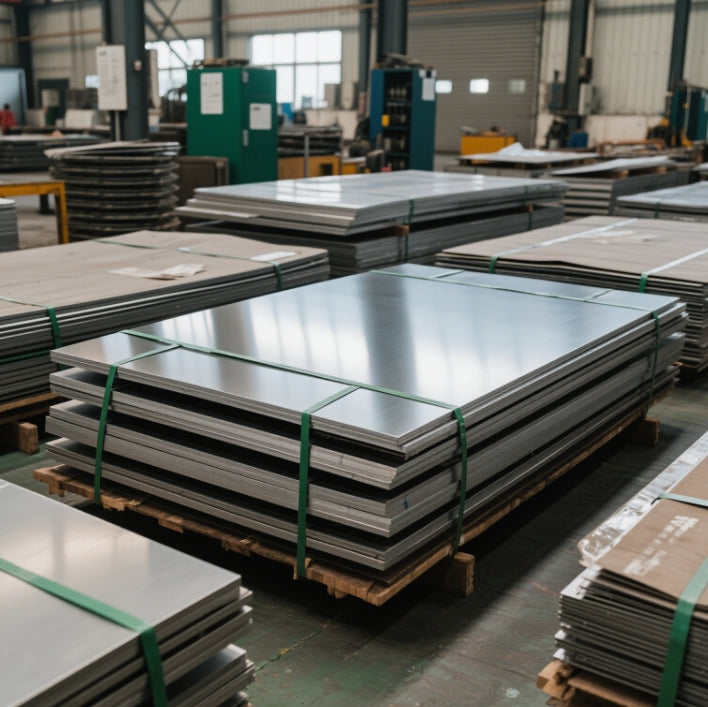StockSteel
Precision 0.20mm 4x8 Stainless Steel Plates | Ultimate CorrosionGuard
Precision 0.20mm 4x8 Stainless Steel Plates | Ultimate CorrosionGuard
Couldn't load pickup availability
Precision 0.20mm 4×8 Stainless Steel Plates | Ultimate CorrosionGuard
Technical Specifications
| Property | Grade 304 | Grade 316 |
|---|---|---|
| Thickness (mm) | 0.20 (±0.01 tolerance) | 0.20 (±0.01 tolerance) |
| Width × Length | 4×8 ft (1219×2438 mm) | 4×8 ft (1219×2438 mm) |
| Hardness (HV) | 170–220 | 215–260 |
| Tensile Strength | 515–720 MPa | 520–670 MPa |
| Yield Strength | 205–310 MPa | 240–290 MPa |
| Surface Finish | 2B, BA, Mirror, Brushed | 2B, Satin, No.4 |
| Density (kg/m³) | 8000 | 7980 |
Certifications: ASTM A240/A480, EN 10088-2, JIS G4304.
Key Properties & Performance
Tensile Strength
The stainless steel plates exhibit exceptional tensile strength due to their cold-drawn manufacturing process. Grade 304 (515–720 MPa) balances ductility and load-bearing capacity, ideal for stainless steel dumpling and dip plate molds requiring precise shaping. Grade 316 (520–670 MPa), enhanced with molybdenum, offers superior resistance to chloride-induced stress corrosion, making it suitable for marine applications and stainless steel license plate screws exposed to road salts.
Bending Strength
Both grades maintain structural integrity under bending stress. Grade 304 allows a minimum bending radius of 1× thickness, while Grade 316 retains shape stability even after repeated thermal cycling (up to 400°C). This property ensures durability in automotive trim and architectural cladding.
Identification & Traceability
Each plate is laser-etched with:
- Grade code (e.g., 304 or 316)
- Heat number for batch traceability
- Compliance marks (ASTM/EN/JIS).
Weight Calculation
Use the formula for precise estimation:
Example: A 4×8 ft (1.219×2.438 m) Grade 304 plate weighs .
Why Stainless Steel Rusts?
Despite chromium’s passive oxide layer (≥10.5% Cr), rust can occur due to:
- Chloride Exposure: Coastal environments or de-icing salts degrade the protective layer, causing pitting (common in Grade 304). Grade 316’s molybdenum content reduces this risk.
- Mechanical Damage: Abrasive cleaning or scratches expose the substrate to oxidation. Our plates’ electropolished finish minimizes surface roughness (Ra ≤0.2µm) to prevent microbial adhesion.
- Chemical Contamination: Acidic/alkaline residues (e.g., industrial solvents) accelerate corrosion. Regular cleaning with pH-neutral solutions is recommended.
Manufacturing Excellence
| Process | Description |
|---|---|
| Cold Rolling | Enhances surface smoothness (Ra ≤0.2µm) for stainless steel dumpling and dip plate production. |
| Laser Cutting | ±0.1mm precision for custom automotive parts, including stainless steel license plate screws. |
| Passivation | Nitric acid treatment removes free iron, boosting corrosion resistance by 30%. |
Applications
- Food Industry: FDA-compliant stainless steel dumpling and dip plate molds with non-porous surfaces for hygienic food processing .
- Automotive: Corrosion-resistant stainless steel license plate screws and trim components tested to withstand 1000+ hours of salt spray (ASTM B117) .
- Architecture: Mirror-finished cladding panels for modern façades, compatible with welding and bending .
Why Choose Our Stainless Steel Plates?
- Certified Quality: ISO 9001, SGS, and CE certifications ensure compliance with global standards .
- Custom Solutions: Tailored dimensions (e.g., 1500×3000mm) and surface finishes (2B, BA, No.4) .
- Stock Availability: 10,000+ tons in stock, ready for same-day dispatch .
- Technical Support: 24/7 engineering assistance for material selection and corrosion prevention .
- Sustainability: 100% recyclable material with low lifecycle carbon footprint.

